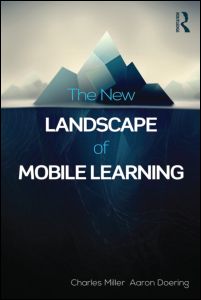New Book Chapter: iTeach and iLearn with iPads in Secondary English language arts
A book chapter I wrote with Gregory Russell (@mrgsrussell), “iTeach and iLearn with iPads in secondary English language arts,” is now out in print in the amazing book, The New Landscape of Mobile Learning: Redesigning Education, edited by Charles Miller and Aeron Doering. This research stems from my larger research study of a suburban high school in their first year of implementing iPads across their high school population. Following is a description of our chapter (note: since we wrote this chapter almost two years ago, there has been empirical research published on the topic.)
“iTeach and iLearn with iPads in secondary English language arts” Chapter Abstract
Tablet computers like the iPad seem to be well-suited for educational purposes, but no empirical research yet exists that examines its potential. This chapter shares the stories of Brett and Julie, two veteran high school English teachers who are integrating iPads into their classrooms for the first time as a part of a 1:1 iPad initiative at Hilly High School. We share an analysis of their practices, developed over the past year via weekly classroom observations, formal interviews and numerous informal discussions. From these risk-taking practitioners, we identify and discuss issues related to pedagogy, assessment, new media literacies, efficiencies, student behavior, engagement, distractibility, and academic integrity. Results indicate that the iPad improves the efficiencies of learning activities but also introduces new classroom management issues. Many teaching and learning activities with the iPad can be both engaging or distracting. Our findings may prove useful to districts, schools, and practitioners who venture to establish similar ubiquitous tablet-supported educational innovations.
The book is available here:
http://www.routledge.com/books/details/9780415539241/
http://www.amazon.com/The-New-Landscape-Mobile-Learning/dp/0415539242
As always, if you would like to read my chapter and are unable to get a copy, please email me at joanh @ austin . utexas . edu
Future teachers’ disposition toward technology integration
A new research article has been published! The full reference is:
Hughes, J. E. (2013.) Indicators of future teachers’ technology integration in the PK-12 classroom: Trends from a laptop-infused teacher education program. Journal of Educational Computing Research, 48(4), 493-518. Download the pre-press version here (which has color figures – there was a mistake in the printing of the print version and they used the wrong figures, making them uninterpretable).
The brief abstract below describes the study which examines preservice teachers’ positioning for integrating technology into their future teaching endeavors.
This research examined preservice teacher graduates’ positioning toward integrating technology in future teaching. Participants included 115 preservice teachers across three cohorts in 2008-2009 who graduated from a laptop-infused teacher education program. The study implemented a case study methodology that included a survey administered upon graduation.Indicators of positioning toward technology integration included: digital technology self-efficacy, attitude toward learning technologies, pedagogical perspective, personal/educational digital technology behaviors during the program, and TPACK knowledge used to rationalize their most valued technologies for future teaching. Results indicated graduates held moderate digital technology self-efficacy, positive attitude toward learning technologies,and moderate constructivist philosophy. During their preparation,productivity software activities were used most widely for educational purposes.Their most valued technologies for teaching subject matter were predominantly productivity software as well as general hardware, such as computers, projectors, and document cameras. They described teacher-centric uses three times more often than student-centered. Graduates showed low depth of TPACK. Teacher education programs need to consider the degree to which their candidates are exposed to a range of contemporary ICTs, especially content-specific ICTs, and the candidates’ development of TPACK, which supports future technology-related instructional decision making. Such knowledge is developed across the teaching career, and technological induction programs may support continued TPACK development.Future research should employ longitudinal studies to understand TPACK development and use across novice and veteran teachers.
Note that TPACK stands for “technological pedagogical content knowledge,” a conceptual idea that assesses an individual’s grasp on different types of knowledge – specifically technology knowledge, pedagogical (or instructional) knowledge, and content (or subject matter) knowledge and intersections of these three. ICT is the international terms for information communication technologies, what is referred to as educational technologies, learning technologies, or just technology in the United States.
